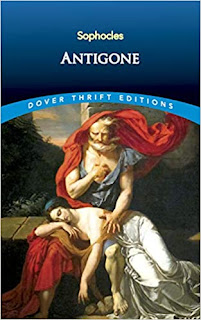You may have heard the phrases “No man is an island,” “For whom the bell tolls,” and “Death be not proud.” All were written by John Donne (1572 – 1631), the former two from Devotions Upon Emergent Occasions, Meditation XVII, and the latter from Holy Sonnet X. “Death be not proud” is one of the most famous sonnets ever written and it is superb. One of my favorites though is Sonnet XIV, “Batter my heart.”
The speaker in the poem seems to have lost his way, even his faith, and asks God to be violent with him in order that he may reclaim it. He does love God but can never be free from “the enemie” unless God batters his heart. His Reason is supposed to defend him, but “proves weake or untrue.” Therefore, the speaker asks to be “enthrall[ed]” and “ravish[ed]”. The passion here is not physical, but spiritual, a complete spiritual overtaking.
Robert Oppenheimer, “father of the atomic bomb,” named the atomic test site “Trinity” after this poem, referring to the “three-person’d God.” At the end of the first act of John Adams’ opera Doctor Atomic, the character of Oppenheimer, expressing his anxiety and doubts, sings the aria “Batter my heart, three-person’d God.” The aria’s lyric is the sonnet, almost intact.
While the language and spellings are from the 16th century, the poem is well worth delving into, especially in times that can make even the strongest confused and anxious.
XIV
BATTER my heart, three person’d God; for, you
As yet but knocke, breathe, shine, and seeke to mend,
That I may rise, and stand, o’erthrow mee,’and bend
Your force, to breake, blowe, burn and make me new
I, like an usurpt towne, to’another due,
Labour to’admit you, but Oh, to no end,
Reason your viceroy in mee, mee should defend,
But is captiv’d, and proves weake or untrue.
Yet dearely’I love you,’and would be loved faine,
But am bethroth’d unto your enemie:
Divorce mee,’untie or breake that knot againe,
Take mee to you, imprison mee, for I
Except you’enthrall mee, never shall be free,
Nor ever chast, except you ravish mee.





